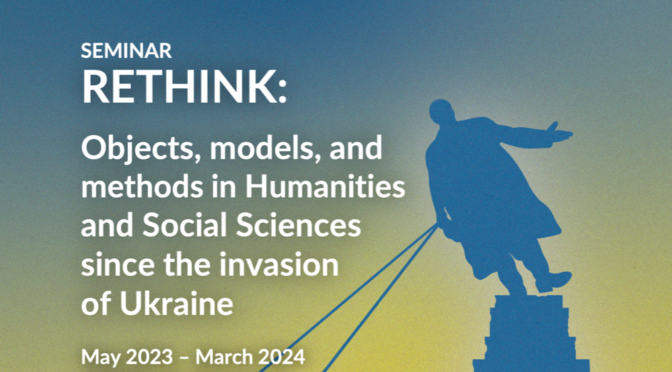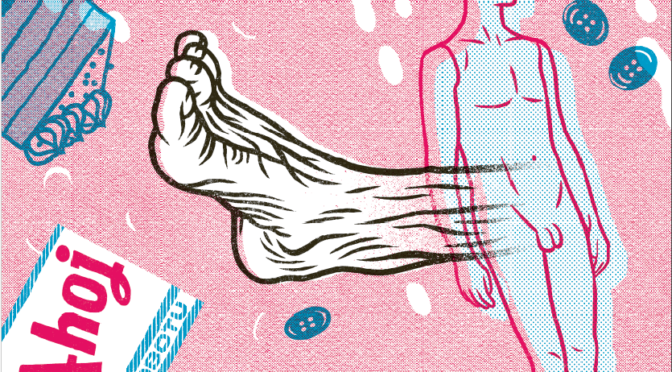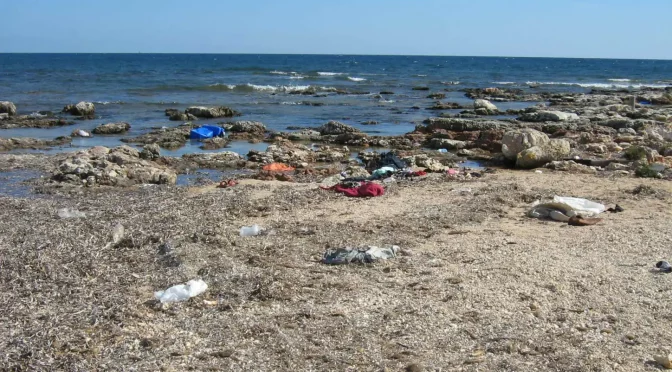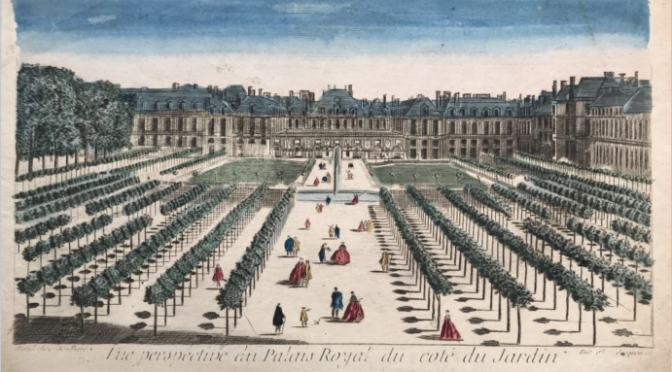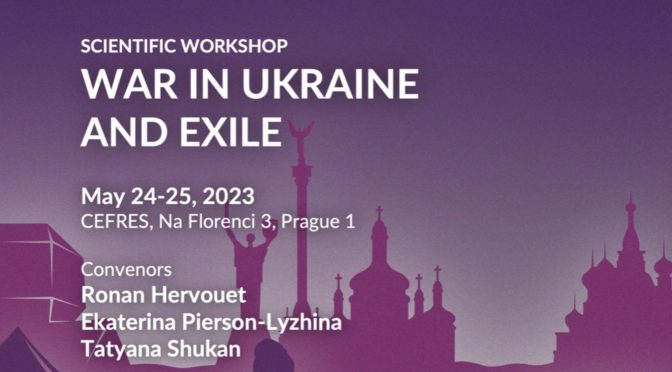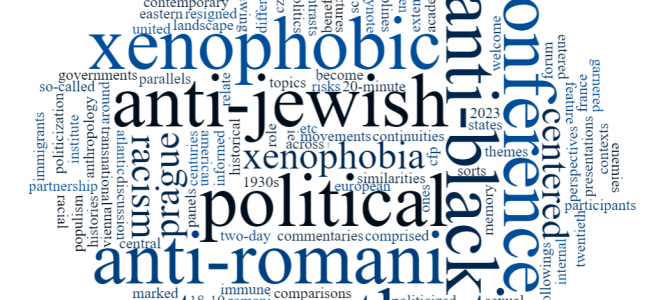Second session of the seminar RETHINK. Objects, models, and methods in Humanities and Social Sciences since the invasion of Ukraine
Continue reading Discursive and memorial transformations in Ukraine
Archives
Biography and “Zoegraphy” of Queer Lives. NANO Seminar #8
The eighth session of the seminar “Nature(s) & Norms” (NANO), carried out within the framework of the research program SAMSON (Sciences, Arts, Medicine and Social Norms), developed by Sorbonne University (Paris), the Faculty of Arts of the Charles University (Prague), Warsaw University and CEFRES welcomes Josef ŠEBEK (Charles University) and
Marcin BOGUCKI (University of Warsaw).
Location: Warsaw, Paris, CEFRES Library and online (zoom)
To receive the link, please contact us at cefres[@]cefres.cz
Date: Friday, June 12th 2023, 4.30 pm
Language: English
The seminar will focus on life narratives of queer people in socialist and post-socialist Central European countries in the 1980s and 1990s, in the period of political and social transformation. The papers will address biographical and autobiographical discourses and texts, from sexological and legal documents through oral autobiographical narrations to genres of life writing (autobiography and autofiction), with an emphasis on the aspects of transformation and the peculiarities of the Central European context in relation to queer theory. The “zoegraphy” in the title points to the troubling dichotomy of what is/can be narrated under changing social and political circumstances and what is lived without necessarily finding textual form.
Part 1
“Pat-a-Cake”: Czech Queer Writing of the Self from the Time of Social Transformation around 1989
Josef ŠEBEK (Charles University)
In the period around 1989, crucial for the transformation of the Czechoslovak society from state socialism to democratic capitalism, several remarkable autobiographical/autofictional narratives were published that revolve around the issues of queerness: Václav Bauman’s Paci, paci, pacičky (Pat-a-Cake, written in 1984, published as samizdat in 30 copies in 1987, then in the samizdat Revolver Revue in 1988, and officially in Prague in 1990 and again in 2017), Václav Jamek’s Traité des courtes merveilles (written in French, dated Paris 1985 – Prague 1988, published in Paris in 1989 and never translated into Czech), and Ladislav Fuks’s memoir Moje zrcadlo (My Mirror, written 1991–1993, heavily edited and published posthumously in Prague in 1995 and in a modified version in 2007). I will analyse these narratives in their peculiar discursive context(s), reflected partially in the intricate ways they were written, edited and published. The analysis will follow the lines of genres of the writing of the self (ranging from the wildly funny emancipatory story through an elaborated autobiographical essay to autobiography suppressing key aspects of politics and sexuality), the discursive ethos of the author/narrator/character, and the politics of sexuality. These texts, taken as a certain synecdoche of queer literary narratives written in the Czech milieu in the period, present a surprisingly varied mosaic of openly pronounced as well as unsaid queer desire and in complex and sometimes contradictory ways participate in the process of social transformation.
Josef Šebek is an assistant professor at the Department of Czech and Comparative Literature, Faculty of Arts, Charles University, and an associated researcher at CEFRES. He specializes in cultural materialism, the sociology of Pierre Bourdieu and current French sociology of literature and works also on contemporary theory of discourse and rhetoric, media theory of literature, genres of life writing, and queer studies. He is the author of the book Literature and the Social: Bourdieu, Williams, and their Successors (Prague, FF UK, 2019), co-author of Richard Müller, Tomáš Chudý et al., Beyond Media Contours: Literature and Mediality (Prague, Karolinum, 2020), managing editor of the journal Slovo a smysl / Word & Sense and a member of the editorial team of Estetika: The European Journal of Aesthetics.
Part 2
Queer Opera Divas: The Case of Three Polish Singers
Marcin BOGUCKI (University of Warsaw)
The cult of diva is inherently connected both to opera and queer culture. In my talk I would like to analyze the iconic status of three contemporary Polish singers in the local context: Ewa Podleś, Violetta Villas, Aldona Orłowska. Although they were all trained as opera performers, they functioned in different musical realms: Ewa Podleś – contralto – was praised for her voice and stage presence on the most prestigious stages in the world, Violetta Villas – coloratura soprano – was regarded as the epitome of camp, mixing opera and popular music, Aldona Orłowska – also soprano – has emerged recently as an Internet phenomenon and can be defined as embodiment of queer art of failure.
Marcin Bogucki – graduate of cultural studies, art history and musicology, assistant professor in the Institute of Polish Culture at the University of Warsaw. His research focuses on the cultural history of music and modern staging of opera. In 2012 he published a book about Peter Sellarsʼs operatic work. Co-author of the book The Chopin Games. History of the International Fryderyk Chopin Piano Competition in 1927-2015 (2021). Member of the Polish Society for Theatre Research (2016-2020 – secretary of the Society), and member of the Organisation Générale des Amateurs de l’Eurovision.
The illustration by Daniela Olejníková from Václav Bauman: Paci, paci, pacičky. 2nd ed. Prague: Filip Tomáš – Akropolis, 2017. Illustration © Daniela Olejníková
See the complete program of the Seminar here.
Tragedies in the Mediterranean on the contemporary Italian and European stage
Third session of the CEFRES 2023 Francophone Interdisciplinary Seminar. The map and the border
In 2023, we would like to start by questionning the very act of bordering and representing (a territory, a period, a trajectory), in short, thanks to the interdisciplinarity of our respective disciplines, to question the map and the border.
Location: CEFRES Library, Na Florenci 3, Prague 1
Dates: Friday, June 9th, 10 am – 11.30 am
Language: french
Chiara MENGOZZI (Charles University), discussant Michèle BAUSSANT (CNRS, CEFRES)
While, until the 1990s, migrant deaths at sea occurred fairly far from the Italian coast, the situation changed in the 2000s, following a number of shipwrecks that were widely covered by the media. Continue reading Tragedies in the Mediterranean on the contemporary Italian and European stage
Nature Management and Emotional Response. NANO #7
The seventh session of the seminar “Nature(s) & Norms” (NANO), carried out within the framework of the research program SAMSON (Sciences, Arts, Medicine and Social Norms), developed by Sorbonne University (Paris), the Faculty of Arts of the Charles University (Prague), Warsaw University and CEFRES welcomes two participants:
Rodolphe GAUDIN (Sorbonne University) and
Małgorzata LITWINOWICZ (Warsaw University).
Location: Paris, CEFRES Library and online
To receive the link, please contact us at cefres[@]cefres.cz
Date: Friday, May 26th 2023, 4.30 pm
Language: English
Part 1
Parc Management as Political Practice and Metaphor. The Politics of Public Space in Karamzin’s ‘Letters of a Russian Traveler’
Rodolphe BAUDIN (Sorbonne University)
While walking around Paris and Versailles in the spring of 1790, Nikolai Karamzin’s Russian Traveller reflects on garden landscaping, improvements made by monarchs or grandees in public parks and popular reactions to these changes. This talk postulates that Karamzin uses the Traveller’s comments on this topic to reflect on the way authorities use parks and gardens to manage public discontent and the way the population oppositely use is it as a space of social Independence to escape disciplining efforts from the top. As a result, this co-management of nature in public space is used as a metaphor for the social contract and its mismanagement by the authorities as a metaphor for the origins of the ongoing French revolution, an event Karamzin reflects on using a nature-based discourse typical for Conservative thinkers in this time.
Rodolphe BAUDIN is a Professor of Russian literature at Sorbonne university. He works on 18th-century sentimentalist culture and ego documents. His current research interests include Descriptive translation studies, disability studies and eco-criticism.
Part 2
Forest as Performed Myth in Literature of Interwar Poland
Małgorzata LITWINOWICZ (Warsaw University)
In my presentation, I will focus on the phenomenon of mythologizing natural spaces, in particular the primeval forest and swamps. They were loaded with various content and engaged for various purposes in interwar Poland – among others, they were to testify to the eternal and natural character of Polishness. So these spaces (its images, descriptions or knowledge about it) were used in the service of state propaganda. Referring to this context, I would like to present in more detail the writings of Maria Rodziewicz, the most popular Polish writer of the interwar period. Her texts served – yes – the propaganda of Polishness, especially in the eastern borderlands and were nationalistically engaged. They were also – like the author herself – queer texts, emphasizing a relationship between man and nature other than exploitation, questioning the accepted gender roles, proposing a new social order. I would like to focus on these paradoxes and their place in Polish imaginary.
Małgorzata LITWINOWICZ is assistant Professor at Institute of Polish Culture (University of Warsaw, Poland). Primary fields of research include 19th century history of Polish and Lithuanian cultures, problems of modernity and modernization, in particular issues related to media transformations and inventiveness. Her research interests include also traditional stories but above all, telling literature. Currently working on a project devoted to “domestication” of the Baltic Sea in Polish culture and the middle-war period and cultural history of national parks in Poland in the same period.
See the complete program of the Seminar here.
War in Ukraine and exile
The scientific workshop “War in Ukraine and exile” will bring together European researchers to present the preliminary results of their interviews and observations conducted after 24 February 2022 among exiles from three countries: Ukraine, Belarus, and Russia. The presentations of papers will address the following themes: trajectories of exiles (mobilised networks, successive displacements), exile experiences (emotions, intimacy), forms of politicisation (ordinary and institutional), interactions between different exiled communities, relations between exiles and host societies/states, relations with relatives left at home, representations and imaginaries associated with the war and its consequences. The workshop is organised in the framework of the BIELEXIL research project. The latter is financed by the flash grant dedicated to Ukraine from the French Collaborative Institute on Migration (Institut Convergences Migrations, ICM).
Roundtable: “The Politicization of Xenophobia in Transatlantic Contexts”
This roundtable discussion takes place within a conference organized by the Prague Forum for Romani Histories.
Today, many people have become resigned to the fact that xenophobia is a central feature of the transatlantic political landscape. From the United States to France to Eastern Europe, political movements centered on the rejection of “the other” (immigrants; racial and sexual minorities, and so-called “internal enemies”) have garnered mass followings and have entered governments that were until recently seen as immune to the sorts of populism that marked the first half of the twentieth century. The roundtable will sum up a conference organized by the Prague Forum for Romani Histories (18-19 May, Villa Lanna) where participants will discuss politicized xenophobia in the past and today. How, we ask, did past xenophobic movements speak to each other across the Atlantic in the past centuries? How have European and American xenophobia and racism in the past informed movements today? What was and is the role of historical memory in the politics of xenophobia? What are the benefits and risks of drawing parallels between the past xenophobic movements and present ones?
Date: Friday 19th of May 2023, 5:00 p.m. – 6:30 p.m.
Location: CEFRES Library
Organizers: the Prague Forum for Romani Histories (at the Institute of Contemporary History of the Czech Academy of Sciences) in partnership with University of Alabama at Birmingham and Romani Studies Program at the CEU in Vienna
Language: English
Convenors: Jonathan Wiesen (University of Alabama at Birmingham), Angéla Kóczé (Romani Studies Program at the Central European University in Vienna), Kateřina Čapková (Institute of Contemporary History, Czech Academy of Sciences).
Chair: Angéla Kóczé
Speakers: Ann Ostendor, Jonathan Wiesen and Vita Zalar
18 May
1:30 p.m. WELCOME
1:45 – 3:15 p.m. KEYNOTE SESSION
Chair: Kateřina Čapková
Angéla Kóczé: Anti-Roma Racism as a Socio-Historical Consensus: 2008–2009 Neo-Nazi Murders of Roma in Hungary
Jonathan Wiesen: US Racial Violence in the German Imaginary
Break: 3:15 –3:45 p.m.
3:45-5:30 p.m. PANEL I: Transnational Xenophobia
Chair: Jonathan Wiesen
Ann Ostendorf: Anti-Romani Political Racism in the Nineteenth Century United States
Tayla Myree: Remembrance to Reparations: A Study of the Strategies towards the Recognition of Atrocities by Roma and African Americans
Tina Magazzini: Racism or Xenophobia? Tracing the Category-making of Racialized Minorities across the Atlantic and their Consequences
Dinner: 6:00 p.m.
19 May
9:00 – 11:15 a.m. PANEL II: The Holocaust and Holocaust Memory
Chair: Helena Sadílková
Christopher Molnar: Holocaust Memory, Racism, and the Roma Refugee Panic in Reunified Germany
Cristina Teodora Stoica: The Politics of Antiziganim and its shaping of Romania’s Holocaust Historical Memory
Mariana Sabino Salazar: The Politics of Memory: Romanies in Mexican and Brazilian Holocaust Museums
Justyna Matkowska: Pogroms on Roma and Sinti in Nazi-occupied Poland during World War II
Break: 11:15-11:45 a.m.
11:45 a.m. – 1:30 p.m. PANEL III: Discrimination and its Legacies
Chair: Martin Fottta
Sunnie Rucker-Chang:The Enduring Impact of School Segregation in the United States and Europe
Michelle Kahn: USA From Nebraska to Berlin, Zagreb, and Beyond: How American Neo-Nazis Shaped the European Far-Right (1970s-1990s)
Dezso Mate: Roma LGBTI Movement – The Politics of Alliance
5:00-6:30 p.m. – Roundtable Discussion hosted by CEFRES, Na Florenci 3
The Politicization of Xenophobia in Transatlantic Contexts
Chair: Angéla Kóczé
Speakers: Ann Ostendor, Jonathan Wiesen and Vita Zalar
See the website of the conference.

